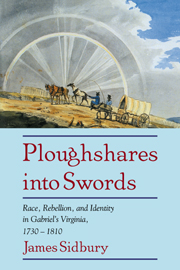Book contents
- Frontmatter
- Contents
- Acknowledgments
- Introduction
- Prologue: From Blacks in Virginia to Black Virginians
- 1 The emergence of racial consciousness in eighteenth-century Virginia
- Part I Cultural process: Creolization, appropriation, and collective identity in Gabriel's Virginia
- Part II Social practice: Urbanization, commercialization, and identity in the daily life of Gabriel's Richmond
- Epilogue: Gabriel and Richmond in historical and fictional time
- Appendix: Richmond households in 1784 and 1810
- Index
1 - The emergence of racial consciousness in eighteenth-century Virginia
Published online by Cambridge University Press: 04 August 2010
- Frontmatter
- Contents
- Acknowledgments
- Introduction
- Prologue: From Blacks in Virginia to Black Virginians
- 1 The emergence of racial consciousness in eighteenth-century Virginia
- Part I Cultural process: Creolization, appropriation, and collective identity in Gabriel's Virginia
- Part II Social practice: Urbanization, commercialization, and identity in the daily life of Gabriel's Richmond
- Epilogue: Gabriel and Richmond in historical and fictional time
- Appendix: Richmond households in 1784 and 1810
- Index
Summary
In 1756 an eleven-year-old Igbo boy was kidnapped from the interior of present-day Nigeria, transported to the coast, and sold into the Atlantic slave trade. After the harrowing Middle Passage, he was offered for sale in Barbados, but sugar planters apparently found him too small to suit their purposes. The slavers packed him back into the ship, fattened him up a bit while sailing to Virginia, and sold him to a tobacco planter. In Virginia, Olaudah Equiano encountered a strange world. He witnessed an enslaved cook wearing an iron muzzle to prevent her from eating the food she prepared for her master. He was ordered to fan his indolent sleeping master, and he feared that a ticking clock was a machine to report to “the gentleman any thing … [Equiano] might do amiss.” And he saw a portrait that he suspected was something the Whites did “to keep their great men when they died.” While he attempted to adjust to this incomprehensible world, his master assigned him a Western name: Jacob.
Equiano found himself in a “forlorn, and much dejected state” in Virginia, for he had been separated from anyone with whom he could speak. He was relieved, at least in retrospect, to be removed from this lonely land by a ship captain named Michael Henry Pascal, who bought the young slave and took him to sea. Pascal, like every other White who had claimed ownership of Equiano, assumed the right to name his chattel and told Equiano that he would henceforth be called Gustavus Vassa.
- Type
- Chapter
- Information
- Ploughshares into SwordsRace, Rebellion, and Identity in Gabriel's Virginia, 1730–1810, pp. 14 - 50Publisher: Cambridge University PressPrint publication year: 1997



